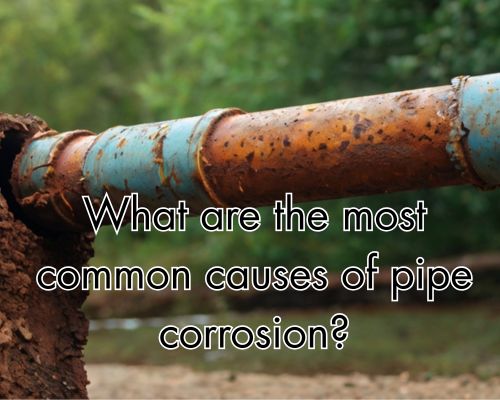
What Are the Most Common Causes of Pipe Corrosion in Australia?
What Are the Most Common Causes of Pipe Corrosion in Australia?
Pipe corrosion isn’t just a nuisance; it’s a costly headache impacting homeowners, industries, and municipal water systems across Australia. Understanding what are the most common causes of pipe corrosion is crucial to preventing premature pipe failure, reducing maintenance expenses, and ensuring safe water supply. From Sydney’s coastal humidity to the mineral-rich waters of Western Australia, the environment here shapes corrosion risks uniquely. Let’s get into details with Dean Owens of Plumber Warragul.

Why Does Pipe Corrosion Matter in Australia?
Australia’s infrastructure depends heavily on pipes — from residential plumbing to large-scale water distribution and industrial processing. Corroded pipes can lead to:
- Water contamination, risking public health
- Leaks and bursts, causing costly repairs
- Reduced water pressure, affecting daily life and industrial processes
- Structural damage to buildings and roads
With increasing urbanisation in cities like Melbourne, Brisbane, and Perth, plus the unique environmental challenges like saline soils and coastal air, tackling corrosion is a top priority.
The Basics of Pipe Corrosion
Corrosion is the gradual degradation of metals caused by chemical or electrochemical reactions with their environment. In pipes, this usually means the metal surface reacts with water, oxygen, chemicals, or microbes, leading to rust, pitting, or even holes.
1. Electrochemical Corrosion: The Primary Culprit
Electrochemical corrosion is the most widespread form, where metal in pipes reacts with water and dissolved oxygen, forming rust (iron oxide). This process is accelerated by:
- Water chemistry: Australian water sources vary; for example, the hard water in some areas contains high levels of calcium and magnesium, while others have high chloride or sulfate ions, which promote corrosion.
- Dissolved oxygen: Oxygen-rich water promotes oxidation reactions.
- pH levels: Acidic water (low pH) found in some Australian regions accelerates corrosion rates.
In coastal cities like Sydney and Adelaide, salty sea air and higher chloride concentrations make pipes especially vulnerable.
2. Microbial Induced Corrosion (MIC)
Australia’s warm climate provides a playground for bacteria that can accelerate corrosion inside pipes. MIC occurs when bacteria such as sulfate-reducing bacteria create corrosive substances like hydrogen sulfide. This form of corrosion is particularly problematic in wastewater and sewage pipes found in cities like Melbourne and Perth.
3. Soil Corrosion: The Underground Menace
Pipes buried underground in Australia face constant interaction with soil, and not all soils are created equal. Certain soil types promote corrosion more aggressively:
- Acid sulfate soils: Found in coastal regions, these soils contain sulfur compounds that oxidize and produce sulfuric acid, eating away at pipes. Common in parts of Queensland and New South Wales.
- Saline soils: High salt content soils, typical in inland Australia, accelerate corrosion by increasing electrical conductivity around the pipe.
- Moisture content: Wet soils create a more conductive environment, speeding up corrosion.
Understanding local soil profiles helps predict and prevent corrosion-related issues in buried pipes.
4. Galvanic Corrosion: When Metals Fight
Australia’s infrastructure often uses mixed metals in piping systems, for example, copper pipes connected to steel fittings. This metal mismatch sets the stage for galvanic corrosion, where one metal corrodes preferentially to the other due to electrical potential differences.
This phenomenon is common in older Australian homes in suburbs of Brisbane or Hobart, where retrofitting newer pipes onto older metal systems occurs.
5. Chemical Corrosion: Industrial and Domestic Influences
In industrial zones such as the Hunter Valley or Western Australia’s mining regions, chemical exposure accelerates corrosion. Chemicals like acids, alkalis, or solvents can degrade pipes rapidly.
Domestically, the use of certain detergents, water softeners, and aggressive cleaning agents can also alter water chemistry, making pipes more vulnerable.
6. Mechanical and Physical Factors
While not corrosion per se, physical damage can expose fresh metal surfaces that corrode faster. Factors include:
- Soil movement due to drought or flooding (common in Australia’s variable climate).
- Improper installation or poor maintenance leading to scratches or damage.
- Water flow velocity: Too high flow can cause erosion-corrosion, physically wearing pipe walls.
How Australia’s Climate and Environment Shape Pipe Corrosion
- Coastal environments: Salt spray and humid air in coastal cities (Sydney, Gold Coast) cause external corrosion on above-ground and underground pipes.
- Arid and semi-arid zones: Dry soils with variable salinity impact buried pipes in inland Australia (Outback areas).
- Urban pollution: Industrial emissions in cities like Melbourne can produce acidic rain, further accelerating corrosion.
Best Practices to Prevent Pipe Corrosion in Australia
Knowing causes is half the battle. Here’s how to defend against them:
- Material choice: Use corrosion-resistant materials like PVC, HDPE, or lined steel, especially in harsh environments.
- Protective coatings: Epoxy or polyethylene coatings protect pipes underground and above ground.
- Cathodic protection: A technique to counteract electrochemical corrosion using electrical currents, commonly used in Australian water mains.
- Water treatment: Adjusting pH and controlling oxygen levels in water supply systems reduces corrosion.
- Regular maintenance: Scheduled inspections in areas like Brisbane and Perth catch corrosion early. See Dean Owens of Plumber Warragul.
Local Resources and Regulations
Australian water authorities and industry bodies provide guidelines:
- Australian Water Association (AWA) offers research on corrosion impacts in local water systems.
- Standards Australia (AS 4020) governs water quality and pipe materials to minimize corrosion risks.
- State water utilities like Sydney Water and Melbourne Water conduct ongoing pipe maintenance and corrosion prevention programs.
Conclusion: Corrosion is Inevitable, But Manageable
Understanding what are the most common causes of pipe corrosion in Australia empowers homeowners, engineers, and city planners to take proactive measures. Whether it’s electrochemical, microbial, soil-related, or galvanic corrosion, every factor has a place in the Aussie landscape.
By combining the right materials, maintenance strategies, and local environmental knowledge, we can extend the life of Australia’s vital piping infrastructure — keeping water clean, systems safe, and wallets happy.